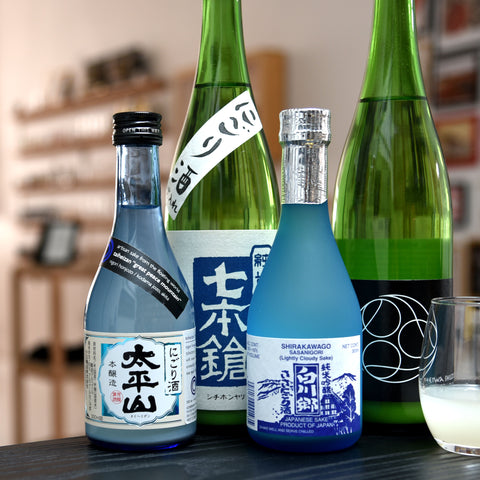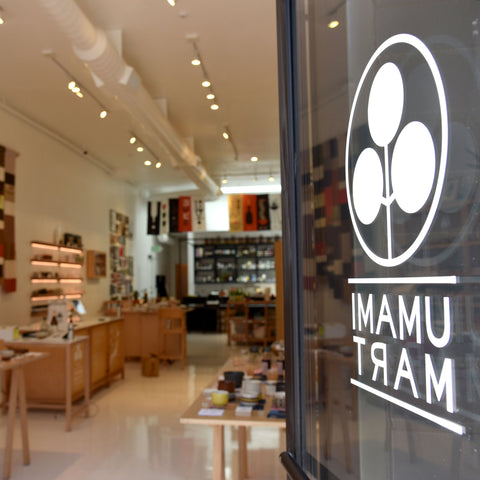Most of you know Yoko – our fearless leader and beekeeper! Inspired by our Umamiventure to a beehive in Oakland in 2012, she has been beekeeping for several years now.

I've watched her journey as a beekeeper since she began: starting off modestly in her backyard in Berkeley, then later moving to Oakland where her hives have grown and are presently thriving (she'll tell you after many ups and downs – catching swarms in random people's yards, hives weakening, often dying). With patience, she made it through to the other side, and was able to harvest honey twice last year, most recently in November. We are lucky to have a limited number of jars of the Kuma Honey available at our shop, and since each harvest differs, I wanted to ask about this particular batch. Thanks Yoko for answering my questions, and for sharing your honey with us!
This new honey has a creamy texture and is very earthy in taste. Can you talk about how and why flavors and textures change with different batches of honey?
The flavor of honey can change from harvest to harvest even if they come from the same hive because the bees will be collecting nectar and pollen from different sources throughout the year. For example, right now, the eucalyptus and manzanita are blooming like crazy in Oakland, and soon they will fade out and wildflowers like clover will be taking over our yards. Eucalyptus honey can be darker in color and tart in flavor, while clover honey can be mild and floral in flavor and lighter. You can see how different the color and opacity is between my last three harvests!
The texture of honey will also change depending on the water content of the nectar they are collecting. If there's less water in the nectar, the honey will tend to crystallize or have a creamy, thick texture. This is the first batch I've had that has a "creamed" texture. I love it because it's so spreadable!
Is it rare to harvest honey in the later part of the year like November? If so, why were you able to harvest?
It is not rare in warm, urban areas like Oakland where there are many things in bloom at any given time of the year. Living in an environment where there are a lot of yards and gardens with a diverse group of flowers that bloom throughout the year can result in a surplus of honey for honeybees as long as they are healthy. The key is keeping the hive healthy.
Late fall is prime time for honeybees to succumb to the Varroa mite, which is a parasitic mite that can take down a hive during a dearth. So if your hive is robust and healthy, they can be producing a surplus of honey pretty much any time of the year as long as there are blooms in the area.
However, it is very common that a colony will die from mites – especially in late fall going into winter. This is something I've grappled with pretty much every year. I've talked to beekeepers from Japan to the Republic of Georgia, and it's apparent that the mites are a worldwide problem. Even if you've done everything you can to protect the bees from mites, the colony can still fail due to ants, other pests, weather, or location.
Nature is fragile and fearless at the same time, and bees are ultimately wild animals. The hives we've designed for them are far from perfect, and to survive, bees have a better chance in the wild. They have taught me that I know very little about their world, and about nature in general – it is wonderfully humbling. I feel lucky enough to live alongside these wonderful creatures that will sometimes tolerate my presence and temporarily take up residence in the homes I've provided.
Any special traits about this honey?
Yes, let me tell you about the harvest itself and how it differed from my previous batches. I love beekeeping because it is challenging and unexpected at every turn. This was my fourth time harvesting so I thought that I'd be done in a couple hours. I also invited a few friends over to help in the harvest.
We quickly realized that the honey had crystallized in the frames. A centrifuge is used for extracting honey, but no matter how fast we spun the frames, the honey would not extract. I had never encountered this problem, so we were trying everything – from wrapping the frames in a heated blanket to putting them in the sun. Nothing was working, so we gave up on some of the frames.
We ended up extracting only about half of the frames I pulled. I later learned from another beekeeper that this honey was likely made from English Ivy nectar. Soon after, I caught up on the latest local beekeepers' Google group thread, and I learned that many in my community were having the same problem. The good news is that we were able to extract half of it.
Ivy honey is very good for cold and flu. And you know what time of the year it is? Cold and flu season! Nature is so giving and perfect, and what do I have to give back in return? Used plastic and fossil fuels.
How do you best enjoy this batch of honey?
I love having my honey in yogurt. You can really taste the honey, and the tart colliding with the sweet is one of my favorite combinations. I also like to just have a little spoonful before I go to bed. It is very calming to have at the end of the day.
Honey is also very good for the skin because of its antioxidants, antiseptic and antibacterial properties. I'll spread a thin layer on my face for about 30 minutes once a week. It'll rehydrate your skin and leave it refreshed!
How long have you been beekeeping and what are your goals this year as a beekeeper?
I started beekeeping in 2013. I had a mentor who let me shadow her for a couple years. Then I started getting really serious about beekeeping in 2017 and I bought bees from
Randy Oliver. Early 2018 was a very rough (I only had one hive and lost it). In the summer of 2018 I advanced into catching swarms. It was such an accomplishment as a beekeeper to overwinter both of those hives going into 2019.
Early 2019 was probably my proudest moment as a beekeeper, as both hives survived. Thinking that I'd lose at least one, I had reserved a swarm in 2018 for purchase in spring of 2019, so by April I had three hives. And in the months following, I split two of the hives. One of the splits went to my mentor and the other went to Kayoko's house! I'm proud to say that three of the four now are doing really well (one is wavering because I had to move it across the yard).
This year will be the first year I won't be buying bees. All of the bees I have will have overwintered and I hope to split at least three of them by end of spring. I'd like to focus on keeping them smaller than I did last year. I've been reading a few of
Thomas Seeley's (Horace White Professor in Biology in the Department of Neurobiology and Behavior at Cornell University) books and am very inspired by his recommendation to reduce the size of hives. Beekeepers often create large hives to increase honey production, but this promotes overcrowding and stress for the bees.
I find, year after year, that the honey part of beekeeping is less interesting than the structure and behavior of the colonies. I'd like to manage my hives in a way where I can promote reproduction of colonies, and share them with neighbors and other beekeepers rather than prioritize honey yield.
Another goal I have for this year is to plant more flowers. When people ask me about what they can do to help bees, my answer is to plant more food for bees and all pollinators. I'd encourage people to plant all types of flowers, but I'd highly recommend planting native plants that require little maintenance and water. I plan to go to the UC Berkeley Botanical Garden center next month and get some native plants like ceanothus and manzanita.
When do you think you will harvest honey again?
If all goes well, I hope to harvest in March or April!














Comments (2)
Hi Doug,
I recommend Kim Flottum’s Backyard Beekeeper.
https://store.beeculture.com/the-backyard-beekeeper-4th-edition-2018/
I also recommend that you sit in on your local beekeeper’s association or befriend a beekeeper to show you their hive and method before you jump all in!
Yoko
I have been thinking of becoming a bee keeper and am encouraged by you to start my own hive. Can you please recommend a book to start my research